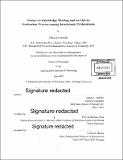Essays on knowledge sharing and an opt-in evaluation process among investment professionals v/
Author(s)
Botelho, Tristan Lee
DownloadFull printable version (10.63Mb)
Other Contributors
Sloan School of Management.
Advisor
Ezra Zuckerman Sivan.
Terms of use
Metadata
Show full item recordAbstract
This dissertation contributes to our understanding of recently popularized opt-in evaluation processes. These processes have been democratized such that ratings are provided no longer solely by experts, but commonly by any audience member who has experienced an offering (i.e., good, candidate, or service) and chooses to rate its quality. The goal of these democratic evaluation processes is to collect independent ratings from evaluators in order to triangulate on a representative and unbiased signal of quality. Across the three chapters of this dissertation, I study various aspects of an opt-in evaluation process to uncover the mechanisms that affect evaluative outcomes. To do so, I use data from an online knowledge-sharing platform and its opt-in evaluation process in the investment management industry where investment professionals share investment recommendations. In Chapter 1, to gain a better understanding of the platform under study, I focus on the conditions that bring these professionals together to engage in knowledge sharing, despite the associated risk of losing competitive advantage. In Chapters 2 and 3, I turn my focus to the evaluation process, in particular, examining who opts to evaluate and how factors unrelated to an offering's quality affect the evaluative outcomes. Chapter 2 examines how social influence, measured as exposure to the ratings from past evaluators, affects the likelihood that subsequent ratings occur and the types of ratings an offering receives. Chapter 3 examines how search costs and uncertainty facing an evaluator affects the likelihood of gender bias in the amount of attention and types of ratings an offering receives.
Description
Thesis: Ph. D., Massachusetts Institute of Technology, Sloan School of Management, 2017. Cataloged from PDF version of thesis. Includes bibliographical references (pages 148-160).
Date issued
2017Department
Sloan School of ManagementPublisher
Massachusetts Institute of Technology
Keywords
Sloan School of Management.